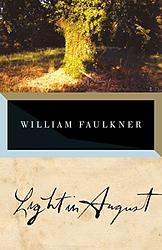Light in August by William Faulkner
Set in the American South during the 1930s, this novel explores complex social and personal issues through the intertwining stories of its characters. The narrative primarily follows a man of ambiguous racial identity on a quest to find his father, a pregnant woman searching for the father of her unborn child, and a disgraced minister attempting to navigate his own moral compass. The book delves into themes of identity, race, and the human struggle for understanding and redemption, all set against the backdrop of the deep-rooted prejudices and social norms of the time.
The 166th greatest book of all time
Ranking Details:
Our ranking system awards points to books based on their appearance and position on curated lists. Here's how it works:
Unranked Lists: For lists without specific rankings, each book receives points equivalent to the list's weight. This approach recognizes the book's inclusion on prestigious lists.
Ranked Lists: Books on ranked lists receive points in two ways:
- Base Points: Initially, every book is awarded points equal to the list's weight, acknowledging its significance.
- Bonus Points: Additionally, books earn bonus points based on their ranking. The total bonus pool, equal to 100% of the list's weight, is distributed among the books, with higher-ranked books receiving more points.
Exponential Distribution: The distribution of bonus points follows an exponential model. This means the top-ranked book (#1) receives significantly more bonus points than those further down the list (e.g., #100). Our algorithm ensures that higher placements are rewarded more generously, reflecting the achievement of a top rank on any given list.
This scoring system ensures that each book's ranking reflects both its presence on multiple lists and its positions within those lists, providing a comprehensive measure of its acclaim and popularity.
Total Points: 1601
Since this book was first published in 1932, there is a penalty of 0%. The age adjusted score is 1601.0.
This is to prevent newer books from reaching super high on the ranked list of the greatest books of all time. The greatest books should also stand the test of time.
- score: 142 -- El Pais Favorite Books of 100 Spanish Authors (Weight: 138)
- score: 138 -- Världsbiblioteket (The World Library) (Weight: 138)
- score: 126 -- Best Foreign Work of Fiction Chosen by Francophone Writers (Weight: 126)
- score: 115 -- The 100 Best Novels of the 20th Century (Weight: 114)
- score: 108 -- ZEIT-Bibliothek der 100 Bücher (Weight: 108)
- score: 103 -- The Best Southern Novels of All Time (Weight: 96)
- score: 94 -- Quintessential American Fiction, According to the Rest of the World (Weight: 90)
- score: 91 -- The Modern Library | 100 Best Novels (Weight: 90)
- score: 90 -- Radcliffe's 100 Best Novels (Weight: 90)
- score: 90 -- Our Users' Favorite Books of All Time (Weight: 90)
- score: 83 -- In Which These Are the 100 Greatest Novels (Weight: 81)
- score: 81 -- TIME Magazine All Time 100 Novels (Weight: 81)
- score: 78 -- The 500 best books of all time from Culture Café users (Weight: 78)
- score: 69 -- The Book of Great Books: A Guide to 100 World Classics (Weight: 69)
- score: 66 -- The Complete 500: OCLC (Weight: 66)
- score: 63 -- Harold Bloom's The Western Canon (Weight: 63)
- score: 60 -- D. G. Myers’ 50 Greatest English Language Novels (Weight: 57)

